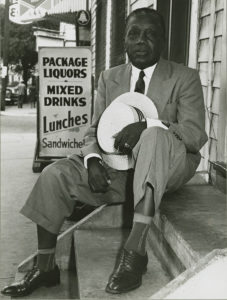Frank Amacker
Frank Amacker, nicknamed “Dude,” was not only a gifted jazz musician, but also an impeccable dresser.

Courtesy of Tulane University, William Ransom Hogan Archive of New Orleans Jazz
Frank Amacker. Mars, Florence (Photographer)
Frank Amacker was a traditional ragtime, jazz, and blues pianist and guitarist from New Orleans. Known to many by his “Dude” or “Dude Robertson” nicknames and as a contemporary of Jelly Roll Morton, Amacker was one of the true “piano professors” of New Orleans, known as much for his impeccable sense of style as for his musical prowess. A beloved New Orleans personality, Amacker was dubbed “Mayor of Storyville” in the 1950s due to his colorful storytelling about the golden era of jazz in the city, much of which was born in that legendary red-light district. Although Amacker is a largely forgotten figure in the annals of New Orleans jazz history and was not recorded until late in his life, his “The Dude”: Frank Amacker Playing Piano and Guitar album, recorded for the Pearl record label in 1965, remains an understudied gem of the genre.
Amacker was born on March 22, 1890, in the West End area of New Orleans, a village on Lake Pontchartrain made famous by Joe “King” Oliver’s song “West End Blues” and further popularized through a recording by Louis Armstrong. Amacker was born into a family of ten children, and he would be the only musician. His father died when Amacker was in his teens, leaving the youth to work odd jobs to help support the family. One such job was sweeping clubs at the end of the evening, and it is likely in this context that he taught himself to play guitar, supplemented by the occasional lesson from various club musicians. In his teens, Amacker took piano lessons from Professor William Nickerson of Southern University, among others. Playing a repertoire of rags, popular tunes, and nascent jazz, Frank was performing in small clubs, brothels, and concert halls throughout New Orleans’s famed Storyville district by 1915. However, there is a reference to Amacker performing with the 101 Ranch Band as early as 1913, playing alongside Jimmie Palao with Oscar “Papa” Celestin and/or Freddie Keppard, William Ridgley, Lorenzo Tio Jr., and Billy Marrero. This information establishes pre-1915 professional musical activity at a specific location in the red-light district.
After Storyville closed in 1917, Amacker traveled to the West Coast to play piano and guitar in Los Angeles. Upon returning to New Orleans, he would work various jobs to supplement his musical career throughout the remainder of his life. As for so many other musicians of his era, the 1950s and 1960s were a pivotal point in his career, as the New Orleans traditional jazz revival was in full swing and the famed Preservation Hall opened its doors in 1961. For a time, Amacker was an intermission pianist at the Hall. As his reputation for spinning tales about the history of New Orleans jazz and the early jazz greats grew, his “Mayor of Storyville” nickname stuck.
Although Amacker is remembered best as a pianist, he is also recognized for his talents as a gifted guitarist. Indeed, five of his guitar tracks were recorded in a 1958 session; they were prominently featured on the audio compilation The 6 & 7/8s String Band, produced largely by Samuel Charters. Later in his life, Amacker’s classic solo album, “The Dude”: Frank Amacker Playing Piano and Guitar, was released in 1965. The album features some of Amacker’s signature pieces, including “Jelly Roll Blues,” “See You in My Dreams,” and “Fast Rag.”
Frank Amacker died on September 1, 1975, in New Orleans.
